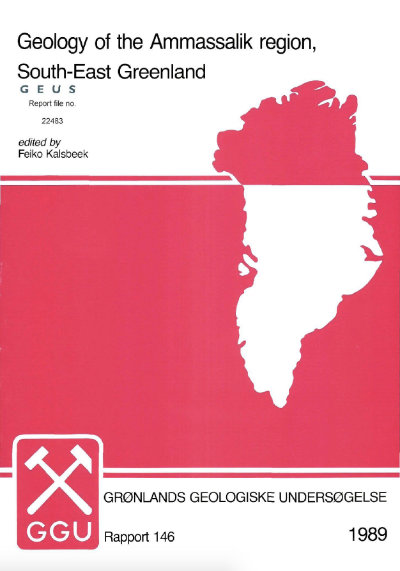The Proterozoic mobile belt in the Ammassalik region, South-East Greenland (Ammassalik mobile belt): an introduction and re-appraisal
DOI:
https://doi.org/10.34194/rapggu.v146.8089Abstract
The Ammassalik mobile belt is characterised by a regional layer cake structure of tectonically interleaved sheets of quartzo-feldspathic orthogneisses and supracrustal rocks. The sheets of supracrustal rocks are most abundant in the north of the belt and they include semi-pelitic kyanite-sillimanite gneisses, graphitic schists, marble, amphibolites and local peridotite. The sheets are regarded as parts of a disrupted supracrustal sequence, here termed the Siportoq supracrustal association. Preliminary isotopic age data suggest that most of the orthogneisses are late Archaean, although some have early Proterozoic ages. The Siportoq supracrustal association has yielded an early Proterozoic age. Amphibolite dyke swarms were emplaced at various stages in the evolution of the mobile belt. The Ammassalik belt has an ill-defined northern limit marked by heterogeneous retrogression of a granulite facies terrain up to 100 km wide. Most of the belt is at amphibolite facies, with its southern limit lying to the south of the area considered here. The structure in the south is dominated by nappes and shear zones dipping NE within a wide tract of late Archaean orthogneisses intruded by amphibolite dyke swarms with relatively well preserved primary characteristics. The structure in the north is characterised by more pervasive deformation which gave rise to complex sequences of thrusting and nappe development propagating from the north. Large domes were superimposed on the nappe pile, perhaps as buoyancy phenomena. The dioritic Ammassalik Intrusive Complex (c. 1885 Ma) with its granulite facies assemblages is regarded as a late kinematic phenomenon. Major post-tectonic complexes of granite, diorite and gabbro (c. 1580 Ma) were intruded at a high level well after the close of the tectonism in the Ammassalik mobile belt.
Downloads
Published
Issue
Section
License
This article is distributed under a CC-BY 4.0 licence, permitting free redistribution and reproduction for any purpose, even commercial, provided proper citation of the original work. Author(s) retain copyright over the article contents.


